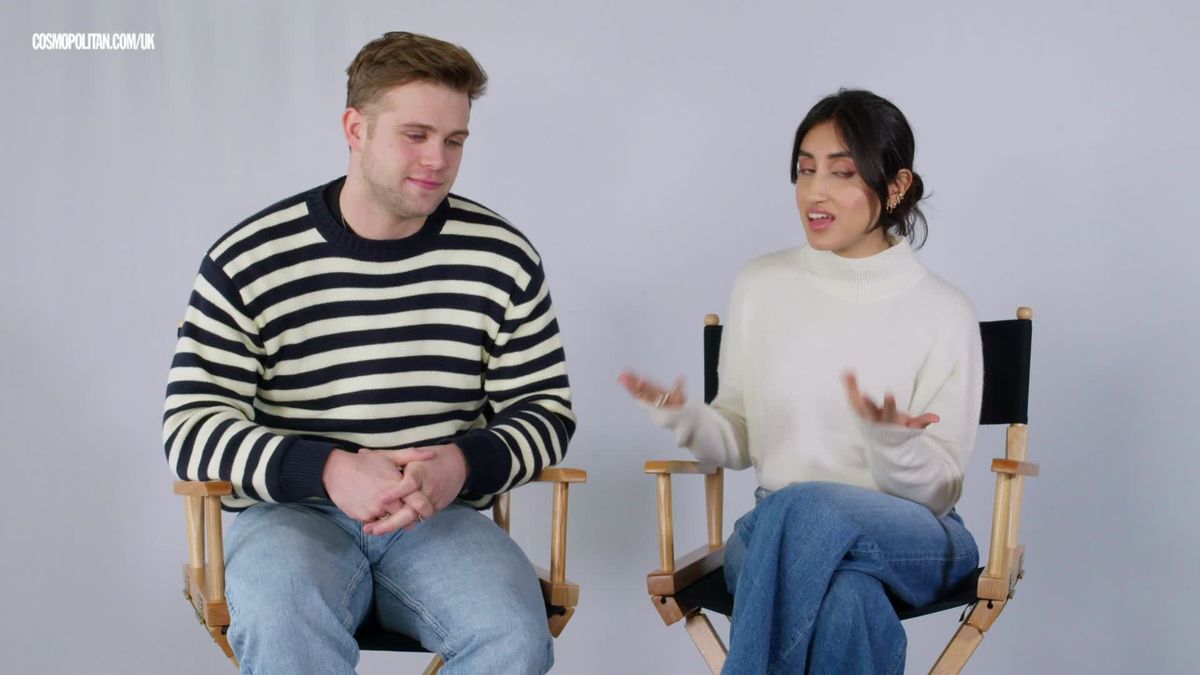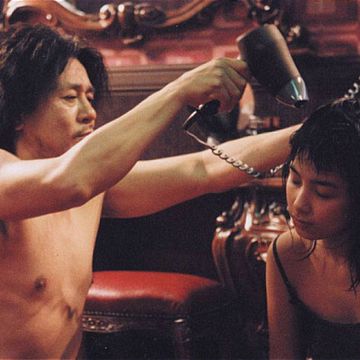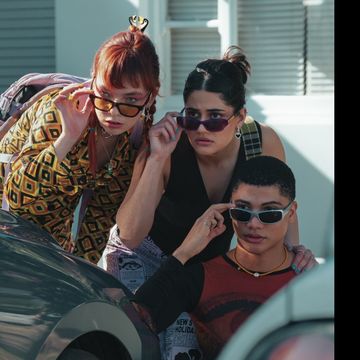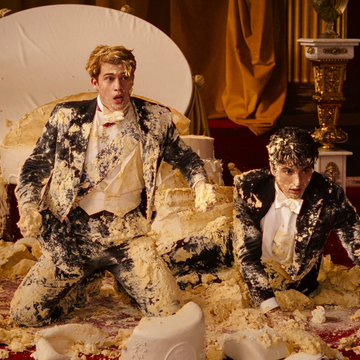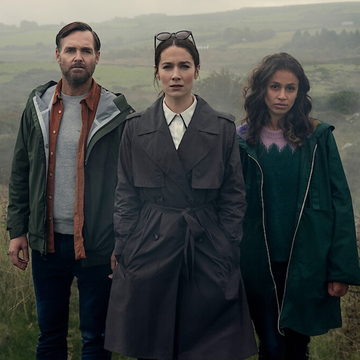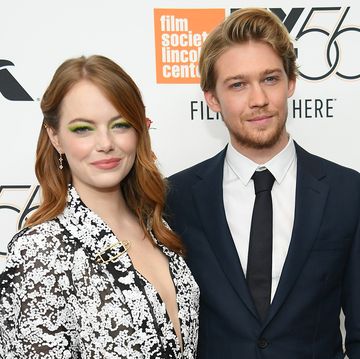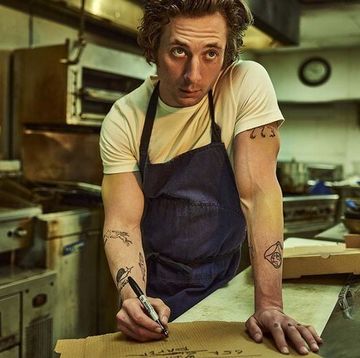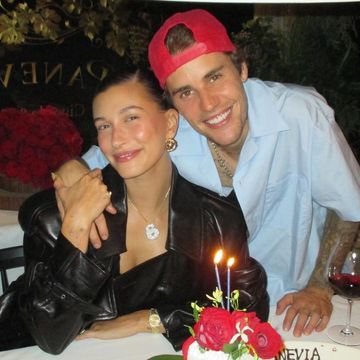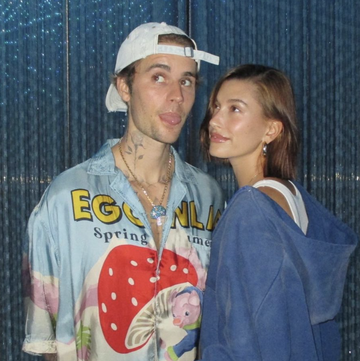She was sipping a margarita, the salted rim coating her lips; the guitar solo vibrated through her body as she moved. The band were so close she could see their stubble aglow with the stage lights, and the crowd, vast and seemingly endless, were chanting, screaming his name – the name of the rock star this woman was going home with that night. Standing beside her at the side of the stage, Faye Moore could only look on in awe. She decided, there and then, what her own future could hold. ‘I just looked at her and knew. It was her style! She was everything I wanted to be.’
Now 21 and resplendent in vintage furs, a bleached blonde mullet and hands that are either rolling a cigarette or gesturing wildly as she tells her own stories of backstage passes and renowned lovers, Faye is living that dream. She is (alongside other things) a groupie. But the term has gone through so many iterations, from ‘music lover’ to ‘slut’ and even ‘victim’, so what does it mean to be a groupie today? Especially in a world in which we no longer follow the tour bus but, instead, the social media pages of our favourite stars and bands. I set out to meet self-proclaimed groupies, past and present, to find out.
‘If we tell you what a groupie is, will you really understand?’ It was the tagline used to describe a 1969 special issue of Rolling Stone magazine, which introduced the underground term and the counterculture of women who embodied it into national consciousness. The article described a groupie as a ‘chick who hangs out with bands’ and stated that ‘becoming a good one is not an entirely simple matter.’ Since then, groupies have cropped up in movies (Almost Famous), been authors of bestselling memoirs (Pamela Des Barres’s I’m With The Band) and influenced everything from song lyrics to catwalks.
‘A groupie is a music-loving person,’ explains Lynx, one half of the podcast Muses, who – alongside her friend Chanty – has been, for the past five years, interviewing and delving into the lives of groupies. ‘I don’t think it just applies to women, it isn’t solely sexual. It’s someone who wants to be in the music scene, but maybe doesn’t have the talent of the musician. They might be the first person dancing, bringing the energy, spreading the word; they just want to see the bands they love succeed and be a part of that success. There’s fans, but groupies... they’re more elevated, they’re integral to the experience of the band.’
For Patti Johnsen, back in 1981, when she first became a groupie, it was the urge to be a part of the magic. ‘I wanted to be a part of the band, a part of the circus... but I didn’t want to be the ringmaster; I didn’t really want to be on the stage.’ Building bonds with the bands she worshipped (touring with Mötley Crüe and Motörhead; working for Van Halen) was a way to do that. Yet, she found that many people could only focus on one thing: sex.
It’s still the presumption today – when I told people about this feature, the response was often, ‘Oh, those women who’ll do whatever a rock star tells them to.’ The one-night stands, and the (at times) exploitive and wild tales of outrageous acts detailed in rock stars’ memoirs (such as Mötley Crüe’s The Dirt) have now overtaken the public’s idea of what it means to be a groupie. These salacious stories are captivating, and sex does play its part, but why – when groupies have influenced so much – is that the first thing people think of when you utter the word?
‘It’s interesting how people have put a sexual term on it, when it’s so much more than that,’ say Chanty and Lynx, who both proudly call themselves ‘groupies,’ but say they understand why some of the women they interview distance themselves from the label. ‘They don’t want the assumption to be that the sole reason these people hung around with them was because of their bodies. But the women who have owned it – Pamela Des Barres, Dee Dee Keel – they’re brave. They’ve said, “If you want to think it was purely sexual, that’s on you, I know it was more.”’
Patti believes the slut-shaming she’s received is directly linked to how women’s sexuality has been treated throughout history.‘It’s all part of this misogynistic tapestry,’ she says. ‘The women who figured out their sexuality, or should I say the power of it, have always been punished. They were burned at the stake!’
She says that becoming a groupie ‘saved’ her from the impact bullies and abusive relationships had on her while growing up.‘It gave me so much power to know that [these rock stars] wanted to be with me. I learned gradually it’s more than that, it’s not just sex by any measure. But it was empowering.’ I loved hearing her stories, told with a husky laughter, of how she’d respond whenever she was judged, recalling the one time she was told not to ‘lower herself ’ and responded, ‘Tonight you’ll go home with someone who will drive you in a Pinto, to their apartment... but I’ll go home in a limo with the guy on stage,’ before adding, ‘If I’m going to have sex with someone and they’ll never call... I’d rather it be Billy Idol.’ It’s why she set up the groupie round-table, an in-real- life group where groupies can discuss everything from the slut-shaming they experience to who their ‘holy grail’ rock star is (the one you love so much you couldn’t even speak to).
For Faye, whose love of music (and those behind the music) spans from the classic rock her dad raised her on, to world-famous house DJs, being a groupie is a part of the current sexual revolution we’re going through. ‘We’re in the wake of open sexuality,’ she says.‘I got into [being a groupie] as part of the term being reclaimed. It now allows women to be shaped and inspired by the music, rather than being misogynistically defined. There’s nothing wrong with wanting to sleep with someone you find sexy. As long as it’s consensual, you should be allowed to do what you want.’
Sex is part of who we are, yet, so often, women are shamed for going out and seeking it. It can seem as if – even in the more open and inclusive landscape we are in – society still wants us to remain impassive when it comes to sex. Let men decide when and how it goes, but never let it be the other way around. ‘People really feel entitled to discuss what women should and shouldn’t do with their bodies,’ say Chanty and Lynx. ‘Rock ‘n’ roll as an entity is beloved for sex and drugs. That’s expected of the men, and they’re praised for it.’
Of course, part of our current sexual landscape has led to rock stars facing their own #MeToo reckoning. The recent Sky documentary Look Away featured accounts from women describing horrific experiences in the 1970s and 1980s. It delves deep into how some famous men believed that money, power and fame meant they could rewrite the rules when it came to consent, and the age of consent with those they slept with.
‘We’re now often looking back on groupie culture,’ say Chanty and Lynx. ‘We can re-examine some parts. We’re not looking back with starry eyes – some things weren’t okay, the age differences, aspects of consent. The important thing is that now, we’re having these conversations. And, hopefully, [rock stars and celebrities] are now much more aware of how important it is that these relationships take place between consenting adults.’
With a bursting wardrobe consisting of chunky Dr. Martens, thick gold chains and pinstripe waistcoats worn as dresses, a huge part of Faye’s groupie journey has been exploring the style. ‘Fashion, sex and music are all intertwined,’ she says. ‘I love the aesthetics of it all.’ Her own style she describes as a ‘1970s groupie pirate,’ and details how before she goes out to any gig, she selects her outfits to match who she wants to be that day.‘A bit of 1970s glam rock, some flamboyancy, opulence...’ She points out that it was the groupies of the 1960s and 1970s who would share clothes with the rock stars they were seeing that influenced the flares, leopard print and gender-fluid style still prevalent among musicians today.
‘It’s the glamour... groupies add something backstage to the vibe, the buzz...’ she says, but is keen to stress that how you look is only a small part of experiencing life as a groupie. ‘I love the music, it’s where everything began.’ And this is a sentiment Patti agrees with: to forge connections with musicians, you must hold your own in conversations. 'These are really magnetic, creative, artistic people looking for someone to talk to,’ she says.
I can see this in every groupie I speak to – they’re all wonderful company. Faye, alongside being a model, has a first-class degree in philosophy and politics (and is incredibly funny); Patti has such a deep grasp on history, constantly spouting facts that fascinate me; while Chanty and Lynx instantly make me feel like we’re old friends. The common ground between all of them? They’re unafraid to go after the lives and experiences that they really want.
It was a lesson Faye learned when she was a teenager and her dad got her side of the stage for Guns N’ Roses (‘they were staying in our hotel and he asked the gig manager for tickets’), and it’s how she lives her life now. ‘Slide into DMs, make eye contact; they can see more than bright lights from the stage. Just ask. Don’t expect things to come to you. I think that’s what makes groupies different – they go out seeking their experiences.’
Chanty and Lynx agree, detailing how every side-of-the-stage experience they’ve ever had has come from being ‘fearless but polite,’ including the time Chanty saw Bob Dylan at a tiny music venue. ‘I just went to the front of the stage and waited for security to come remove me... and they never did.’
But while side-of-the-stage moments, clutching access-all-areas passes, stand out in their memories, for all four, the real joy came from the impact they’ve had on the music and the musicians’ lives. For Chanty and Lynx, it’s seeing the bands they’ve supported from smaller venues in their hometowns making it into the huge stadiums; for Faye, it’s the friendships she’s made; and for Patti, it’s the handwritten letters she once exchanged with Lemmy, the bassist from Motörhead. ‘I have a box of them, they’re all wax-sealed. He’d send me his lyrics and I’d write back what I thought of them. He always said to me, “You are my lionhearted friend.”’
Is it this element of groupie culture that’s slowly slipping away from us? Back in the 1960s, 1970s and 1980s, often, artists’ only access to what their fans thought and felt about their music came from the groupies. There were no staged meet and greets, no social media pages, no protective PR and management teams around them. According to Patti, you showed up at around 4pm with sound check, got to know the crew, then got a pass backstage. So, with fan and artist relationships taking place almost entirely in today’s digital sphere, how do stars allow their fans to influence their music?
Beyond the beats
Sitting outside, blue skies above him, his back propped up against a garden shed, Yungblud, aka Dominic Harrison (the Yorkshire-born singer, songwriter and actor), is telling me he doesn’t want to talk about him. ‘It’s not about me, it’s about fucking us. It’s Dec, it’s Wolfie, it’s Jools...’ he says, listing off the names of his fans.‘It’s these people who didn’t want to settle for misery in the world. We came together.’
What the 24-year-old is doing, is taking the connection between fan and artist and putting it above everything. From personally calling up fans to interviewing them on his podcast on BBC Sounds, not only does he care more about getting to know them than having chart-topping hits, he speaks to his fans via his music. There is the song Mars he wrote after speaking to a transgender fan at a gig, and Polygraph Eyes, which addresses sexual assault, reminding his male fans to ‘leave it alone mate, she doesn’t want to go home with ya.’ He wants to voice the issues felt by his generation.
‘Yungblud is the direct relationship between me and [my fans]; it is two people, in a room, having a conversation. It’s so broad for me to say that, but it’s why the connection is so deep, I just wanted to find mates. It’s why when I played [at smaller venues] and there would be 100 people in the audience, I’d go out and meet everyone,’ he says. ‘I was living 18 years of my life feeling like there’s nobody out there like me, feeling like a complete alien. But when you find the people who think like you and communicate like you... it’s as if you’ve found your lungs for the first time, because you can breathe.’
It’s this part of groupie culture that’s so often forgotten. Take away the preconceived notions of sex and wild parties, and what’s left is a deep connection forged over lyrics, music, fashion or a lifestyle that helps you feel like you belong. And that goes both ways.‘It’s this idea that’s spanned since the dawn of rock ‘n’ roll music – you somehow speak to me in a way that makes sense in this world of confusion, and that’s why I follow you. These people understood me when the world didn’t... it’s mutual adoration,’ says Yungblud, who credits his fans with saving his life.‘[It’s] made such a massive impact on me,’ he adds.
Just before we spoke, Yungblud was preparing for a series of gigs in various sold-out auditoriums all across America. His popularity and success is growing each day, yet his ‘entire aim is to make it feel like I’m playing in a 150-capacity club.’ It can be – he believes – created through his fans connecting with each other, and the time he spends on social media chatting to everyone. It does seem like a huge, out-of-reach, day-dreamer task but, somehow – after all the time I’ve spent digging into the connection between fans, muses, groupies and artists – I really believe that he can do it.
There’s something magical about groupiedom; there’s such devotion to pursuing who you are and the things you love, which casts a spell that spans years and generations. Yes, social media has changed so much and yes, celebrity culture has altered dramatically since the 1960s, 1970s and beyond but, at its heart, being a groupie has always meant seeking out that musical experience and being a part of it. And that’s still overwhelmingly possible.
There are now so many ways, whether it’s working in the industry yourself (Lynx and Chanty pointed out that many of the groupies from decades gone by saw it as their way into a hugely male-dominated field, something we no longer need to do) or just finding your community and connecting with fellow fans, ensuring you’re the one who’s screaming the loudest (and having the most fun). It’s all out there waiting for you. Or, in the words of Almost Famous’ Penny Lane,‘it’s all happening’.




